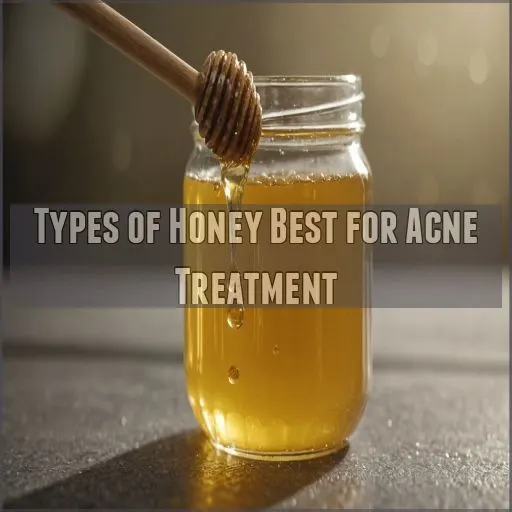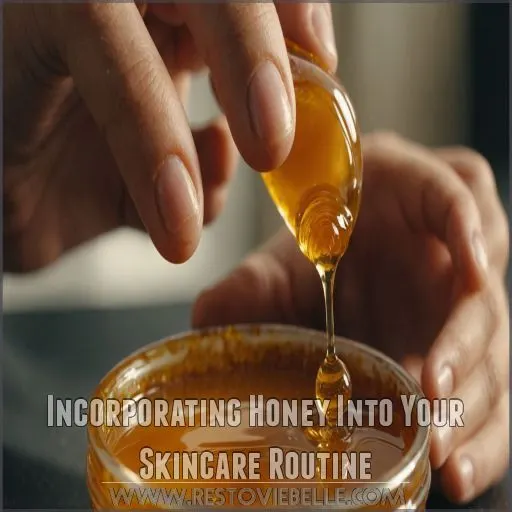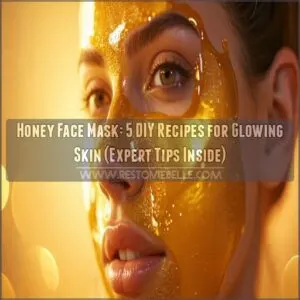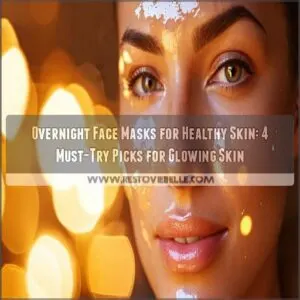This site is supported by our readers. We may earn a commission, at no cost to you, if you purchase through links.

Raw honey’s antibacterial whiz, thanks to hydrogen peroxide, makes it tough for pesky pimples to hang around. Manuka honey ups the game with methylglyoxal, a mouthful just means it’s super effective.
Plus, honey’s anti-inflammatory nature soothes your skin like that cool sip of lemonade on a hot day. It’s gentle on the skin, balances pH, and even speeds up scar healing.
Fancy skipping the harsh chemicals? Honey’s your natural ally. Stay tuned to find out how to integrate this liquid gold into your routine for a clear, radiant complexion.
Table Of Contents
- Key Takeaways
- The Science Behind Honey’s Acne-Fighting Properties
- Types of Honey Best for Acne Treatment
- Effective Ways to Use Honey for Acne
- Potential Risks and Side Effects of Honey
- Honey Vs. Traditional Acne Treatments: a Comparison
- Incorporating Honey Into Your Skincare Routine
- Frequently Asked Questions (FAQs)
- Is raw honey good for acne?
- Is honey good for pimples?
- Is honey good for Zits?
- How does honey affect acne?
- Is honey good for acne?
- How long to leave honey on acne?
- Can I apply honey directly on my face?
- What are the side effects of applying honey on the face?
- Can honey reduce acne scars effectively?
- How does honeys viscosity help acne care?
- Is raw honey better than processed for acne?
- Does honey interact with other acne treatments?
- Are there specific honey brands recommended for acne?
- Conclusion
Key Takeaways
- Nature’s Magic for Zits: Raw honey, especially Manuka honey, is like having a little dermatologist in a jar. It fights acne with antibacterial and anti-inflammatory powers without the harsh side effects. It’s like bringing Mother Nature into your bathroom cabinet!
- Spot Treatment to Sleep Aid: Dab a bit of honey on a stubborn pimple as a spot treatment and let it work. Think of it as your skin’s sweet lullaby, calming redness and irritation while you catch some Z’s.
- Mix and Mingle: For a face mask with flair, combine honey with ingredients like yogurt or aloe vera. Each pairing brings a unique set of benefits to keep your skin soft and balanced. It’s a bit like a skincare smoothie!
- Allergies Need Attention: While honey sounds sweet, it can cause irritation or an allergic reaction. Do a patch test before diving in, and keep your skin’s unique quirks in mind with every application.
The Science Behind Honey’s Acne-Fighting Properties
Ever wondered why honey’s more than just a sweet treat for your toast?
It’s got some impressive zit-zapping powers thanks to its natural antibacterial properties and ability to calm angry, red spots on your skin.
Antibacterial Effects of Raw Honey
Within the sticky sweetness of raw honey lies a powerful acne-fighting secret.
You’ll be amazed at how this natural wonder zaps zits:
- It produces hydrogen peroxide, a bacteria-busting superhero
- Its high sugar content and low pH create a hostile environment for microbes
- It draws out excess water, drying out pesky pimples
You’re in control of your skin’s destiny. Dab some raw honey on that stubborn spot and let nature work its magic.
Manuka Honey’s Unique Benefits
You’ve heard about raw honey’s acne-fighting prowess, but Manuka honey’s the real superstar.
It’s like nature’s antibiotic for your skin! Packed with methylglyoxal, this New Zealand wonder packs a punch against pesky pimples (Source).
Its low pH speeds up healing, while its unique compounds keep your skin’s microbiome in check. Think of it as your skin’s personal bodyguard, zapping zits and keeping them at bay is like your skin’s personal bodyguard.
Think of using Manuka honey as giving your acne the sweet treatment.
How Honey Combats Inflammation
While Manuka honey stands out, all types of honey pack a powerful punch against inflammation. Honey’s secret weapon? Its anti-inflammatory compounds that soothe angry skin and reduce redness. It’s like having a tiny army of skincare superheroes at your fingertips!
- Inhibits pro-inflammatory enzymes
- Reduces oxidative stress
- Modulates immune response
- Promotes anti-inflammatory cytokine production
So next time your skin’s throwing a temper tantrum, reach for the honey jar – your face will thank you!
Honey’s Role in Wound Healing
Honey’s healing prowess extends beyond fighting inflammation.
It’s a natural wound-healer, zapping zits like a superhero. Research shows honey’s antibacterial properties speed up tissue growth, making it a powerhouse for acne scars.
Its high sugar content hinders microbial growth, while its enzymes produce hydrogen peroxide, keeping those pesky bacteria at bay. Plus, honey’s low pH enhances healing by off-loading oxygen from capillaries, giving your skin a helping hand in the healing process with its antibacterial properties.
Balancing Skin’s PH With Honey
Balancing your skin’s pH is like finding the sweet spot for your complexion.
Honey’s acidic nature (pH 3.2 to 4.5) helps maintain your skin’s natural pH balance.
This golden elixir acts as a gentle face pack, harmonizing your skin’s ecosystem.
When you apply a honey mask, you’re not just pampering yourself – you’re giving your skin a pH tune-up.
It’s like a reset button for your face, helping to keep those pesky zits at bay.
Types of Honey Best for Acne Treatment
When choosing honey for acne, it’s good to know that not all types offer the same benefits.
While raw honey keeps it natural and effective, Manuka honey stands out as the "gold standard," often leaving processed honey trailing with fewer acne-fighting powers.
Raw Honey Vs. Processed Honey
You may be tempted by that cute honey bear, but processed honey lacks the skin-loving benefits of raw, unfiltered varieties.
Raw honey retains its natural enzymes, antioxidants, and antibacterial properties that can help clear up acne.
Look for minimally processed options to get the most from honey’s sweet acne-fighting powers.
Manuka Honey: the Gold Standard
Imagine your skin finding freedom from zits with Manuka honey—the gold standard of honeys.
Known for its unique potency, thanks to high MGO ratings, it battles bacteria and inflammation like a pro.
Sourcing genuine Manuka is key, as it can outshine benzoyl peroxide or salicylic acid in soothing scars.
And hey, that’s the sweet truth of nature, with Manuka honey being the gold standard of honeys.
Local Honey Benefits for Skin
Manuka may reign supreme, but don’t underestimate local honey’s charm for your skin.
Seasonal variations create a blend of pollen benefits and allergy prevention, offering unique support for your acne-fighting regimen. Plus, choosing local honey means you’re supporting local beekeepers.
Local honey also boasts antibacterial and anti-inflammatory properties that can help soothe irritated skin and reduce redness.
Who knew helping your skin could also create a buzz in your neighborhood? It’s sweet sustainability!
Organic Honey Considerations
Local honey nourishes your skin and supports nearby bees—two birds with one stone! Now, consider organic options, ensuring purity without pesticide residues.
Ethical production and sustainability matter too; they safeguard bee health.
Opt for raw or unprocessed honey, as processing nips antibacterial benefits in the bud.
Choose wisely to control your skincare destiny while giving nature a helping hand.
Effective Ways to Use Honey for Acne
You’re curious about natural skincare, and honey might be the sweet solution your acne needs.
Let’s explore some effective ways you can use honey to treat those stubborn zits while keeping your skin calm and happy.
All without the stickiness of a honey jar exploding in your bag, this will make for a gentle and convenient blackheads treatment using honey for skincare solution
.
Spot Treatment Technique
Treat acne with a honey spot treatment using raw honey, a natural powerhouse with antibacterial properties, to soothe beard skin irritation
.
Dab a small amount onto a blemish using a clean Q-tip. Aim for once daily application, and watch redness and swelling reduce overnight.
Just remember, if your skin throws a tantrum with irritation, it’s best to stop and try another approach with a different method, such as using less raw honey .
Full-Face Honey Masks
Switching from spot treatments, try a full-face honey mask. Use a simple DIY honey mask recipe: mix one tablespoon of honey with a teaspoon of lemon juice.
Honey is a natural humectant, attracting and retaining moisture, which can help soothe acne-prone skin. Manuka honey, with its higher MGO levels, can provide enhanced antibacterial properties more on natural humectants.
Apply this blend, avoiding the eyes, and let it sit for 15 minutes. Once a week should do the trick. Enjoy clearer skin without breaking the bank, but patch-test first to avoid any honey mask risks.
Overnight Honey Applications
Overnight honey applications work their magic while you sleep.
Just dab a thin layer of raw honey on problem areas and let it work its antibacterial and anti-inflammatory wonders.
The honey helps kill acne-causing bacteria, reduce redness, and promote healing – so you’ll wake up with clearer, glowing skin.
Sweet dreams!
Honey-Based Exfoliation Methods
After nourishing your skin overnight, try honey-based exfoliation methods to maintain that glow.
Create your own DIY exfoliators with these simple recipes:
- Honey & sugar masks provide gentle exfoliation, sloughing off dead skin cells.
- Mix honey with ground oatmeal for a soothing scrub.
- Add a dash of baking soda for extra acne-fighting power without harshness.
Combining Honey With Other Natural Ingredients
Imagine your skin thanking you as you blend honey with yogurt or aloe vera for acne relief.
Honey’s antibacterial magic joins aloe’s soothing touch, while yogurt adds a probiotic punch.
| Combination | Benefit |
|---|---|
| Honey & Yogurt | Probiotics and cleansing |
| Honey & Aloe Vera | Soothing and hydrating |
| Honey & Cinnamon | Antibacterial boost |
Remember, a little honey goes a long way!
Potential Risks and Side Effects of Honey
When you smear honey on your face hoping for clear skin, it’s easy to forget it mightn’t play nice with everyone.
Sure, honey sounds sweet and natural, but it can still spark allergic reactions or irritate sensitive skin.
So it’s worth doing a quick patch test before slathering it on.
Allergic Reactions to Honey
As you explore ways to use honey for acne, it’s wise to think about potential allergic reactions.
Some folks experience honey allergy symptoms like itching, swelling, or even anaphylaxis due to pollen in honey.
Before honey sweetens your skincare routine, think about honey allergy testing.
If needed, seek honey alternatives or treatments to avoid these risks.
Stay safe and savvy!
Honey’s Impact on Different Skin Types
While honey offers acne-fighting magic, it’s not a one-size-fits-all.
On dry skin, it acts as a humectant, bringing moisture. For oily skin, its antibacterial properties shine.
Sensitive skin might embrace its soothing nature, though patch testing is wise, as Manuka honey has a low pH that can balance the skin’s natural environment, just like choosing the right hair removal cream is key for sensitive skin
.
Additionally, certain types of honey, like Manuka honey with high MGO content, exhibit stronger antibacterial activity Choosing the Right Manuka Honey.
Combination skin folks can enjoy honey’s balancing act, but always stay alert to how your skin reacts.
Overuse and Skin Sensitivity Issues
Considering different skin types, overusing honey could make things worse.
You might experience irritation or even a honey allergy, causing sensitive skin to rebel like a toddler at bedtime.
Imagine your skin barrier crying out for help—it’s!
Applying too much honey could damage it, leading to more woes than wins.
Use wisely, friend, and remember to apply honey with caution it requires.
Interactions With Other Acne Treatments
Certain acne treatments, like benzoyl peroxide, salicylic acid, and retinoids, may interact with honey.
While honey’s antibacterial and anti-inflammatory properties can complement these treatments, it’s really important to consult your dermatologist.
Avoid using honey alongside antibiotics or chemical peels, as they can cause irritation. Moderation is key – too much honey may dry out your skin.
Honey Vs. Traditional Acne Treatments: a Comparison
When you’re tackling acne, you might wonder if honey could outshine the usual powerhouses like benzoyl peroxide or salicylic acid.
Let’s explore whether this sweet remedy can stand up to the traditional treatments, saving your skin and maybe even your wallet with honey.
Honey Vs. Benzoyl Peroxide
Balancing effectiveness and side effects, honey may be gentle on your skin while benzoyl peroxide hits pimples hard.
Honey’s got that natural vibe, bringing antibacterial and soothing properties without the burn.
However, benzoyl peroxide is often the heavyweight champ for fast results, but can dry you out faster than a desert sunrise .
Choose based on your skin’s needs!
Honey Vs. Salicylic Acid
Imagine you’re at a skincare crossroads: honey or salicylic acid?
Honey soothes with its natural touch, ideal for sensitive and dry skin, but lacks robust backing against acne’s root causes.
Salicylic acid, a seasoned pro, clears pores and fights oil, though it might dry you out.
Balancing effectiveness, cost, and side effects, your choice depends on your skin’s story.
Long-Term Effects on Skin Health
You might find honey’s long-term skin benefits quite intriguing.
Unlike traditional acne treatments that can irritate, honey nurtures your skin microbiome and supports healing without harsh side effects.
Its natural compounds may slow aging, giving your skin a youthful glow, just like a vitamin e face mask does, by reducing the appearance of fine lines and wrinkles, resulting in a youthful glow with antioxidant face benefits
.
Toss those chemical treatments, and embrace honey’s gentle and lasting approach for skin health changes.
Cost and Accessibility Considerations
When considering cost and accessibility, honey might be the bee’s knees.
Local honey is often more affordable and accessible than traditional acne treatments like benzoyl peroxide, which can sting you budget-wise .
DIY solutions with honey offer cost-effective alternatives for all budgets. Plus, storing honey is a snap—no expiration date drama like costly skincare products.
Incorporating Honey Into Your Skincare Routine
Adding honey to your skincare routine isn’t just sweet, it’s practical.
Whether you choose daily spot treatments or weekly face masks, consistency can be your best friend in tackling those pesky pimples.
Daily Vs. Weekly Honey Treatments
Wondering if you should use honey daily or weekly for acne?
The sweet solution lies in your skin type.
For oily, acne-prone complexions, a daily honey cleanse can help balance bacteria and reduce inflammation. But for sensitive skin, a weekly honey mask may be gentler.
Either way, raw, unpasteurized honey packs the biggest punch.
Dietary Considerations for Acne-Prone Skin
Imagine this: You’re savoring a sweet spoonful of honey. But could your diet be a culprit in acne? Absolutely!
To manage acne, consider these tips:
- Cut Dairy and Sugar: Reduces inflammation and sebum production.
- Avoid Processed Foods: They can trigger acne flare-ups.
- Embrace Omega-3s: Promotes anti-inflammatory benefits and gut health.
Maintaining Consistency for Best Results
To integrate honey into your skincare routine, consistency is key. Think of it like watering plants—small, regular applications lead to flourishing skin.
Frequency matters, so aim for daily or every-other-day usage. Patience needed—long-term effects won’t appear overnight.
Motivation tips: set reminders or make it part of your relaxation ritual. Remember, skin success starts with regular care.
Frequently Asked Questions (FAQs)
Is raw honey good for acne?
Raw honey, packed with beneficial components, can help soothe acne due to its antibacterial properties.
Though it’s not as strong as standard treatments, it may ease inflammation and redness.
Consider trying it for milder cases.
Is honey good for pimples?
You might’ve heard honey helps with acne.
While its antibacterial properties can soothe inflamed spots, it’s not a one-size-fits-all solution.
For serious pimples, combine honey with proven treatments like benzoyl peroxide or salicylic acid.
Is honey good for Zits?
While honey may have some antibacterial benefits, it’s not a reliable acne solution.
Instead, try products with proven acne-fighting ingredients like benzoyl peroxide or salicylic acid to tackle those pesky zits head-on.
How does honey affect acne?
Honey helps balance skin bacteria, making it a potential option for reducing acne.
It works by inhibiting bacterial growth and soothing inflammation, but it’s not a standalone solution.
Pair honey with effective home remedies for the best results
.
Is honey good for acne?
Dabbing honey on your pimples seems like nature’s magic, but it’s not a standalone acne fix.
It helps calm red and has antibacterial properties, yet more research is needed to prove its effectiveness fully.
How long to leave honey on acne?
Keep honey on your acne for about 10 to 15 minutes to let its natural antibacterial properties work magic.
If you’re feeling adventurous, leaving it on overnight can enhance healing and reveal glowing skin toners naturally
.
Can I apply honey directly on my face?
Applying raw honey directly on your face is generally safe.
It’s packed with antibacterial properties, soothing inflamed skin while adding a sweet touch to your skincare routine.
Just watch out for allergies.
What are the side effects of applying honey on the face?
Applying honey to your face can cause irritation, especially if you’re allergic to pollen or bees.
Always test on a small patch of skin first.
Leaving honey on too long can attract dirt, worsening skin conditions (Source).
Can honey reduce acne scars effectively?
While the sweet stuff may offer some soothing benefits, the evidence suggests honey isn’t as potent as traditional acne treatments for reducing stubborn scars. (Source)
However, it could help calm inflamed blemishes.
How does honeys viscosity help acne care?
Honey’s high viscosity acts like a natural barrier, shielding your skin from bacteria that cause acne.
This sticky texture helps lock in moisture while its antibacterial properties tackle those pesky pimples without relying on harsh chemicals.
The antibacterial properties of honey also help tackle those pesky pimples, making it an effective ingredient in acne treatment, with its natural barrier being the key to its effectiveness.
Is raw honey better than processed for acne?
Did you know manuka honey has been found much more effective against acne than other popular treatments?
Using raw honey for acne may balance skin bacteria, thanks to its anti-inflammatory and antibacterial properties, unlike processed versions.
Does honey interact with other acne treatments?
Honey doesn’t interact with acne medications. It’s safe to use with treatments like doxycycline or isotretinoin.
Honey alone hasn’t shown effectiveness for acne, so keep expectations in check and pair it with proven treatments.
Are there specific honey brands recommended for acne?
Imagine finding gold among fool’s gold.
While honey has some benefits, there aren’t specific brands specifically for acne.
Manuka honey is popular for its antibacterial properties, but consult traditional treatments for effective acne management with traditional treatments.
Conclusion
Surprisingly, about 85% of people between ages 12 and 24 experience acne, and honey could be your secret weapon.
Its natural compounds can fight off bacteria and soothe inflammation, making honey for acne a practical choice.
Whether you’re dabbing it on as a spot treatment or mixing it into a mask, honey offers a gentle, accessible alternative to harsher chemicals.
So, give this sweet remedy a shot, and you might just find your skin thanking you with clearer days ahead.












